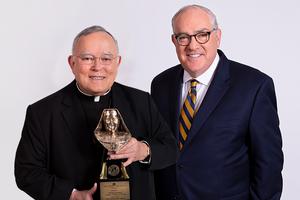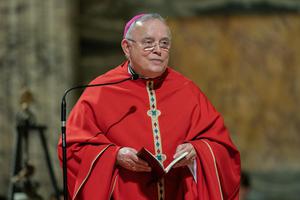Synod Fathers’ Choice: Defend Truth of Marriage and Family or Give in to the Spirit of the Age
COMMENTARY: We are eyewitnesses to God’s purification of his Church.

Observing the Ordinary Synod of Bishops on the Family over the past two weeks, I am convinced that we are witnessing God’s action to purify his Church, the Bride of Christ. Though evidence of manipulation highlights individuals’ will to power, I am sure that God’s grace and providence is mightily at work throughout this crisis. This should not surprise us because it is the future of his Church that is being decided at the synod.
Today, God puts before us a choice, to either uphold the life-giving, merciful and saving truths about marriage and sexuality entrusted to us by him, or to abandon these divine truths out of willingness to compromise with the secular spirit of the age and its culture of death.
Over the past year, as we’ve watched with increasing distress settled divine doctrines of the Church treated like man-made propositions open for debate, correction and amendment, I know that many faithful Catholics will share the prayer of my heart, “It is time for the Lord to act; your law is being broken” (Psalm 119:126). And I think we can discern Our Lord acting at the synod to both strengthen faithful synod fathers and thwart those who are chronically unfaithful.
The Love of Christ Impels Us to Speak Out
St. Paul teaches us that God strengthens the faithful apostle to proclaim the Gospel when other disciples desert the faith, “But the Lord stood by me and gave me strength to proclaim the Gospel fully, that all the Gentiles might hear it” (2 Timothy 4:17). Such fortitude in proclaiming the fullness of the truth is not self-generated, but is the compelling grace of God. True disciples cannot but speak out about the Gospel (Acts 4:20), because the “love of Christ impels us” (2 Corinthians 5:14).
During the past two weeks, we have witnessed the love of Christ impelling a number of synod fathers to stand before Pope Francis and their peers and clearly proclaim the truth of divine doctrines, without fear of a secular backlash, both within and outside of the synod hall. I want to single out two synod fathers whose fearless and compassionate speaking of the truth exhibits the working of God’s resolute grace — Cardinal Peter Erdő of Hungary and Archbishop Charles Chaput of Philadelphia. Thankfully, other synod fathers have also spoken as true successors of the apostles, but I’ll limit myself to these two.
Cardinal Erdő Proclaims the Splendor of Truth
Cardinal Erdő, as the general relator, had the official duty of delivering the introductory report to the synod, setting before the gathering the questions to be discussed. He took this opportunity to do so from the perspective of the Church’s unchanging and, he insisted, unchangeable divine doctrine. Cardinal Erdő gave a succinct and clear overview of the state of the pastoral issues impacting the family, emphasising and showing in their beautiful interconnection and integrity, divine truth and compassion.
In response to those synod fathers in Cardinal Walter Kasper’s camp seeking to allow divorced-and-remarried Catholics to receive holy Communion, despite being in a state of what the Church considers permanent adultery, Cardinal Erdő reiterated eight times the importance of the divine doctrine and reality of indissolubility. For example, he stated:
“Regarding the divorced and civilly remarried, a merciful, pastoral accompaniment is only right — an accompaniment, however, which leaves no doubt about the truth of the indissolubility of marriage taught by Jesus Christ himself. The mercy of God offers to sinners pardon, but demands conversion.”
Cardinal Erdő systematically showed the error of the various proposals to allow the divorced and remarried to receive holy Communion — so-called penitential ways involving confessors granting absolution without the penitent’s intention to stop committing adultery; versions of the Orthodox Church’s allowance under certain circumstances for divorced-and-remarried persons to receive Communion; versions of so-called “lifestyle ecumenism” that focuses on the good in the adulterous relationship, while ignoring the act of adultery. Cardinal Erdő exposed the moral nonsense of all these proposals through the light of the doctrine of indissolubility, the reality of sin and the difference between good and evil. This sentence from Cardinal Erdő’s report stands out for its clarity and moral common sense:
“Between true and false, between good and evil, in fact, there is no graduality; even if some forms of cohabitation bring in themselves certain positive aspects, this does not imply that they can be presented as good.”
Archbishop Chaput Speaks of the Hope of Christ’s New World
Archbishop Chaput, fresh from hosting the World Meeting of Families in Philadelphia, delivered two important interventions (talks) that spell out the harmful implications that arise from some of the innovative proposals. He first called out the “subtle hopelessness” in the face of the many and varied challenges facing the family that he detected in the working document of the synod, the instrumentum laboris. He identified this “subtle hopelessness” as the cause behind those calling for overturning divine doctrine:
“This leads to a spirit of compromise with certain sinful patterns of life and the reduction of Christian truths about marriage and sexuality to a set of beautiful ideals — which then leads to surrendering the redemptive mission of the Church.”
Pope St. John Paul II, in his post-synodal apostolic exhortation Ecclesia in Europa (The Church in Europe), wrote that hopelessness was one of the underlying existential causes of Europe’s social and familial crises. It’s not surprising, then, that those synod fathers displaying “a spirit of compromise with certain sinful patterns of life” mostly come from Europe. Archbishop Chaput, following Pope St. John Paul II’s lead, offers the antidote to this “spirit of hopelessness”:
“The work of this synod needs to show much more confidence in the word of God, the transformative power of grace and the ability of people to actually live what the Church believes. And it should honor the heroism of abandoned spouses who remain faithful to their vows and the teaching of the Church.”
In his second intervention, Archbishop Chaput challenged those arguing for Rome to devolve authority to national episcopal conferences. This proposed devolution would allow national conferences to make changes to disciplinary practices, such as the prohibition of divorced-and-remarried people to receive holy Communion, in order to meet doctrinal challenges. Archbishop Chaput pointed out that such proposals threatened the communion of the Catholic Church, with a veiled reference to the German bishops’ earlier threat to go their own way if the synod didn’t deliver communion for the divorced and remarried:
“Our most urgent need is unity, and our greatest danger is fragmentation. Brothers, we need to be very cautious in devolving important disciplinary and doctrinal issues to national and regional episcopal conferences — especially when pressure in that direction is accompanied by an implicit spirit of self-assertion and resistance.”
There Are None So Blind as They Who Will Not See
St. Paul is also clear that God punishes those who refuse to love the divine truths that he has displayed in his creation and has entrusted to the Church. He allows individuals who have become indifferent to the truth, and “delighted in unrighteousness,” to come under the influence of Satan and become increasingly infatuated with error:
“Therefore, God sends upon them a strong delusion, to make them believe what is false, so that all may be condemned who did not believe the truth but had pleasure in unrighteousness” (2 Thessalonians 2:11-12).
Sacred Scripture shows us that God punishes people who have no love of the truth, who come to an accommodation with sin, by giving them over to the consequences of their error and sin. Simply put, they develop an implacable moral blindness to sin in general and their own sin in particular. This is expressed in the aphorism, “There are none so blind as they who will not see.”
What I find incomprehensible about the synod is that, after Cardinal Erdő clearly setting out divine doctrine on marriage, on behalf of the Pope as relator general, the synod fathers didn’t stand up to a man and declare, “Peter has spoken,” though I’m sure many will have thought along these lines in their hearts. Accepting God’s doctrine as a settled matter, the synod fathers could have then proceeded to deliberate over how best to proclaim divine truth in the 21st century and how to better express these unchanging doctrines in pastoral practice.
Infatuation With Error
Instead, the past two weeks have sharpened the realization that some cardinals and bishops think that they can, with impunity, force the change of moral doctrines on the immorality of adultery, homosexuality and fornication. Instead of making a frontal assault on sexual doctrine, some are advocating changing the language of sexual ethics. Basilian Father Thomas Rosica, the Holy See’s English-language spokesman, reported at the first press conference that one of the themes raised by some of the synod fathers was changing the Church’s language about homosexuality:
“There must be an end to exclusionary language and a strong emphasis on embracing reality as it is. We should not be afraid of new and complex situations. The Jubilee of Mercy also requires a new form of language, both public and private. [It] requires a language of mercy. … The language of inclusion must be our language, always considering pastoral and canonical possibilities and solutions.”
God has always been and remains merciful. God has always called and continues to call people to be included is his family. Let us state this truth clearly with new courage and new conviction from our trust and thankfulness in his mercy. But this will not be achieved by a language which hides the truth. In dropping the ethical language of “intrinsic disorder” and “acts of grave depravity” about homosexual sex acts, the doctrine on homosexuality would also be changed. This would be a false act of mercy that deceives homosexual men and women, because God has made clear in revelation the immorality of homosexual sex acts.
The Breakup of the Catholic Church
Father Rosica also indicated that some synod fathers proposed devolving the question of allowing the divorced and civilly remarried to receive communion from Rome to the national level:
“What is needed is not necessarily a universal solution to complex problems, but discussions in small groups and discussions in regional, national and continental groupings to talk about the solutions to the different areas, the different problems, which are not necessarily the same throughout the world.”
But if they succeed in doing this, they change the nature of the Church so that she is no longer one, holy, catholic and apostolic. For example, proposals to devolve decisionmaking powers over allowing the divorced and remarried to receive holy Communion to national bishops’ conferences will break the communion of the Catholic Church. If enacted, we may well see the Church in most parts of Europe abandoning the doctrine of indissolubility by allowing couples in a permanent state of adultery to receive Communion and the Church in Africa upholding the doctrine of indissolubility by maintaining the prohibition of people committing adultery from receiving holy Communion. If this situation were to happen, the Catholic Church would no longer exist in Europe, having finally fallen to liberal Protestantism.
Observing the synod on the family, I know that God upholds the indissolubility of marriage, and so he remains faithful to us and will work his action to purify his Church, the Bride of Christ. We are not left hopeless, but strengthened to defend his truth.
Deacon Nick Donnelly is a contributor to EWTN Radio’s Celtic Connections program.
This article originally appeared in the Catholic Voice newspaper
and is republished here with permission. It has been edited for style.
- Keywords:
- archbishop charles chaput
- cardinal peter erdo
- deacon nick donnelly
- father thomas rosica
- pope francis
- synod_2o15
















